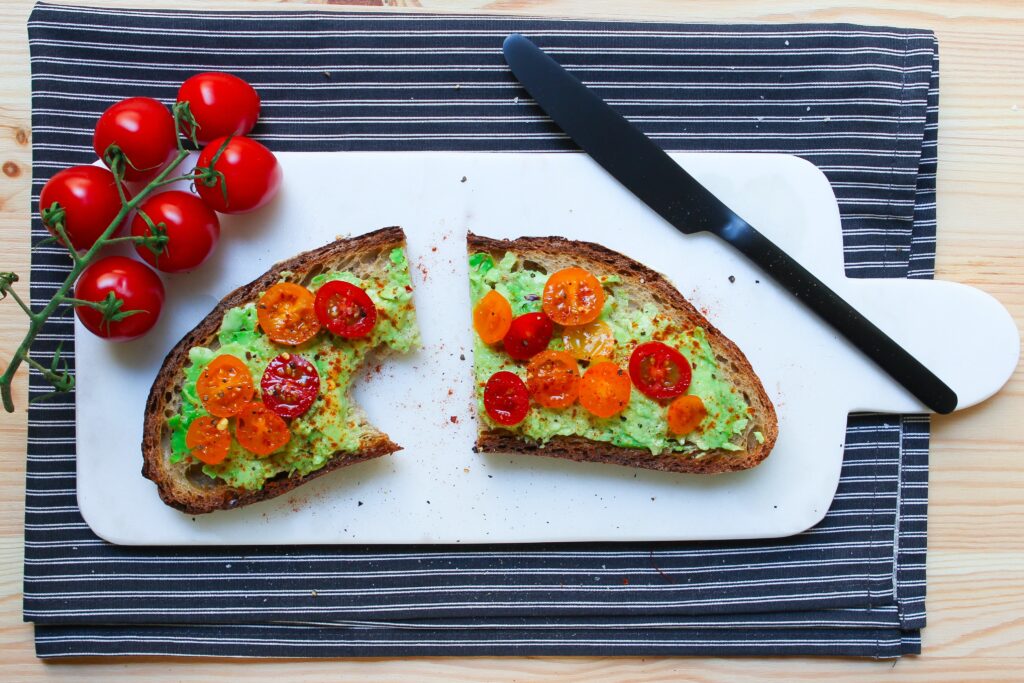News Team member Alexa Morales describes the need for new prenatal nutrition guidance to include fiber, as it promotes stronger microbiomes and better health outcomes in mothers and their babies.

Editor’s Note: This is part of a series sharing videos made by Human Health students in the Health 1, 2, 3 program. To see an overview of the program and this series please read this post.
By: Sarah Wright
Nutrition is not a top priority for most busy, college students. And that makes sense: there are not any moms or dads on campus cooking students’ meals and telling them to eat their greens. Most students feel there is barely enough time to keep up with school, friends and sleep–let alone the amount of time and money needed to make salad. It’s no wonder most of us opt to stuff a Pop-tarts down our throats.
Most undergraduates, many without a car, feel they do not have access to grocery stores off-campus. And the predominant college mindset is that eating healthy at the school cafeteria will not get you an A on the next psychology test. That may not be the case, though, as eating healthy might just help you get an A on that test and can be just as easy and inexpensive as that Pop-tart.
In my film, “Toast to a Healthy Week!,” I address this misconception by showing that students do not have to sacrifice their main values for nutrition. Through nutritional research and in-depth interviews with Emory students as part of the Center for the Study of Human Health’s 4th level program of Health 1, 2, 3, I found that increasing the consumption of whole foods and promoting “eating the rainbow” would most benefit Emory undergraduates–as well as college students everywhere–and encourage academic success.
“Whole” foods have many beneficial properties. They are predominantly less processed, additive-free foods. By “eating a rainbow” of whole fruits and vegetables we increase the amount and variety of essential vitamins and minerals consumed in our diet.
By eating a balanced diet consisting of whole foods, fruits, and vegetables, we provide our body with a wide array of important nutrients that help boost energy levels.[1] Moreover, eating often and not skipping meals (such as breakfast), can help reduce production of the stress hormone cortisol, which has been associated with negative mood.[2-4] Based on interviews with students, I concluded that academic success and happiness are among Emory students’ top values.
Leaning on the findings from my research, the nutrition film I created aligns with trends documented by literature and the values identified in my peer interviews in order to address barriers to fruit and vegetable consumption among students on Emory’s campus.
The film follows a week of 7 healthy and energizing toasts. Each recipe combines whole grain toast with a lean protein and a fruit or vegetable for long-lasting energy. The toasts range from almond butter plus banana to cottage cheese and bell Pepper. This easy-to-follow three-step formula allows students to venture outside the film’s recipes and create personalized healthy toasts.
All the ingredients in the toasts are available on-campus and can be found at the weekly Farmer’s Market and Eagle Emporium. I worked with the Health 1, 2, 3 Program to create this film and I have found that health really can be easy as 1, 2, 3—easy as a pop-tart. Toast is just one-way students can make a nutritious, inexpensive meal in under 5 minutes. Whole foods are readily available for Emory students and now information on where to find them and how to eat them is available too.
References
- Academy of Nutrition and Dietetics. Eating to Boost Energy. EatRight. https://www.eatright.org/food/nutrition/healthy-eating/eating-to-boost-energy. Published July 2019. Accessed July 22, 2020.
- Piedmont Healthcare. What happens to the body when you skip meals? Piedmont. https://www.piedmont.org/living-better/what-happens-to-the-body-when-you-skip-meals. Accessed July 22, 2020.
- Tesfaye N, Seaquist ER. Neuroendocrine responses to hypoglycemia. Ann N Y Acad Sci. 2010;1212:12-28.
- Wirth MM, Scherer SM, Hoks RM, Abercrombie HC. The effect of cortisol on emotional responses depends on order of cortisol and placebo administration in a within-subject design. Psychoneuroendocrinology. 2011;36(7):945-954.

